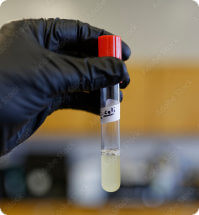Our intestines are the home of millions of bacteria that together form our gut flora; this is called the microbiome or microflora. A healthy gut flora plays a very important role in our digestion and in maintaining a healthy immune system. These bacteria don’t make you sick, but are actually important for your health and the prevention of diseases. The microbiome can continuously change, for example due to the food we eat, the medication we use or the lifestyle we have. Gut health therefore goes far beyond just digesting food and absorbing nutrients. In this article we will take you through the gut flora: what is a healthy and unhealthy gut flora, which symptoms can you develop with a poor gut flora and most importantly: how do you keep your gut health as healthy as possible? Read on.


Causes and symptoms of poor gut flora
Everyone has a different gut flora; the composition of your gut flora depends on many factors, including your lifestyle, medication use and medical history.
A healthy gut flora is able to break down and absorb nutrients, and helps the immune system to prevent infections. In addition, the gut flora synthesizes certain vitamins, such as vitamin K and certain B-vitamins. An unhealthy gut flora is a flora that is out of balance, causing the distribution between good and bad bacteria to be disturbed. This imbalance can cause various gut problem symptoms, such as abdominal pain, flatulence, diarrhea, constipation, fatigue and decreased appetite. In addition, an unhealthy gut flora can lead to problems digesting food and absorbing nutrients. This can lead to a deficiency in important nutrients such as vitamins and minerals, resulting in a range of physical complaints. In addition, the bad bacteria in the gut can produce gases, which can lead to abdominal pain, flatulence and a bloated feeling. An unhealthy gut flora can also lead to diarrhea and constipation.
The causes of an unhealthy gut flora are diverse and complex and are currently being widely studied. One of the main causes of a disturbed microbiome is an unhealthy lifestyle, such as a diet high in processed foods and low in fiber, stress and lack of exercise. The use of antibiotics and other medications can also affect the gut flora, as they not only kill harmful bacteria, but also kill good bacteria. Research has shown that people with certain conditions have an altered microbiome composition. However, we do not yet know if this change is due to the disease or if the altered microbiome has actually caused the disease.



It is important to know that an unhealthy gut flora does not always have to cause symptoms. Some people have a disturbed gut flora without experiencing any discomfort. Conversely, people with gut complaints may have a healthy gut flora. Therefore, it is important to listen to your body and to contact a doctor if you have persistent gut complaints.
Self-test colon examination
There are several tests available to assess the health of the gut flora, including stool testing, breath tests, and blood tests. These tests can provide insight into the composition of the gut flora and can help identify specific bacteria that may be responsible for an unhealthy gut flora. However, it is important to note that knowledge about the gut flora is still evolving and more research is needed to fully understand the significance of these tests. At Easly, we offer a gut and microbiome test that allows you to easily determine whether there is an imbalance in your microbiome.
Related tests


Restoring the disrupted gut flora with lifestyle
Fortunately, there are several ways to improve gut flora with lifestyle. A fiber-rich diet can increase the diversity and number of healthy bacteria in the intestines. Other foods that can contribute to a healthy gut flora are vegetables, fruits, whole grains, and fermented foods such as yogurt and kefir. Regular physical activity can also contribute to a healthy gut flora. A recent study has shown that regular physical activity can help restore an unhealthy gut flora. Avoiding stress and getting enough sleep can also contribute to a healthy gut flora. Smoking has a proven structurally negative effect on the microbiome.

Probiotics and prebiotics may also contribute to good gut health in some people. Probiotics are live bacteria that are supposed to be beneficial to the gut flora and can be found in fermented foods and supplements. However, there is still insufficient evidence that probiotics can make a relevant and significant contribution to gut health. Prebiotics are dietary fibers that are not digested by the body but serve as food for healthy bacteria in the intestines. Prebiotics can be found in foods such as garlic, onion, bananas, and oats and are proven effective for gut health.


Conclusion
A healthy gut flora is of great importance to our health. An unhealthy gut flora can lead to various symptoms and can contribute to the development of gastrointestinal disorders. Fortunately, there are several ways to improve gut flora through lifestyle, including eating fiber-rich foods, regular physical activity, and avoiding stress. It is important to remember that knowledge about the gut flora is still evolving and that more research is needed to fully understand the significance of the gut flora and the role lifestyle can play in improving it.
Sources:
Voedingscentrum – Microbioom https://www.voedingscentrum.nl
- MDL stichting – Microbioom https://www.mlds.nl
- Voedingscentrum – Probiotica https://www.voedingscentrum.nl








